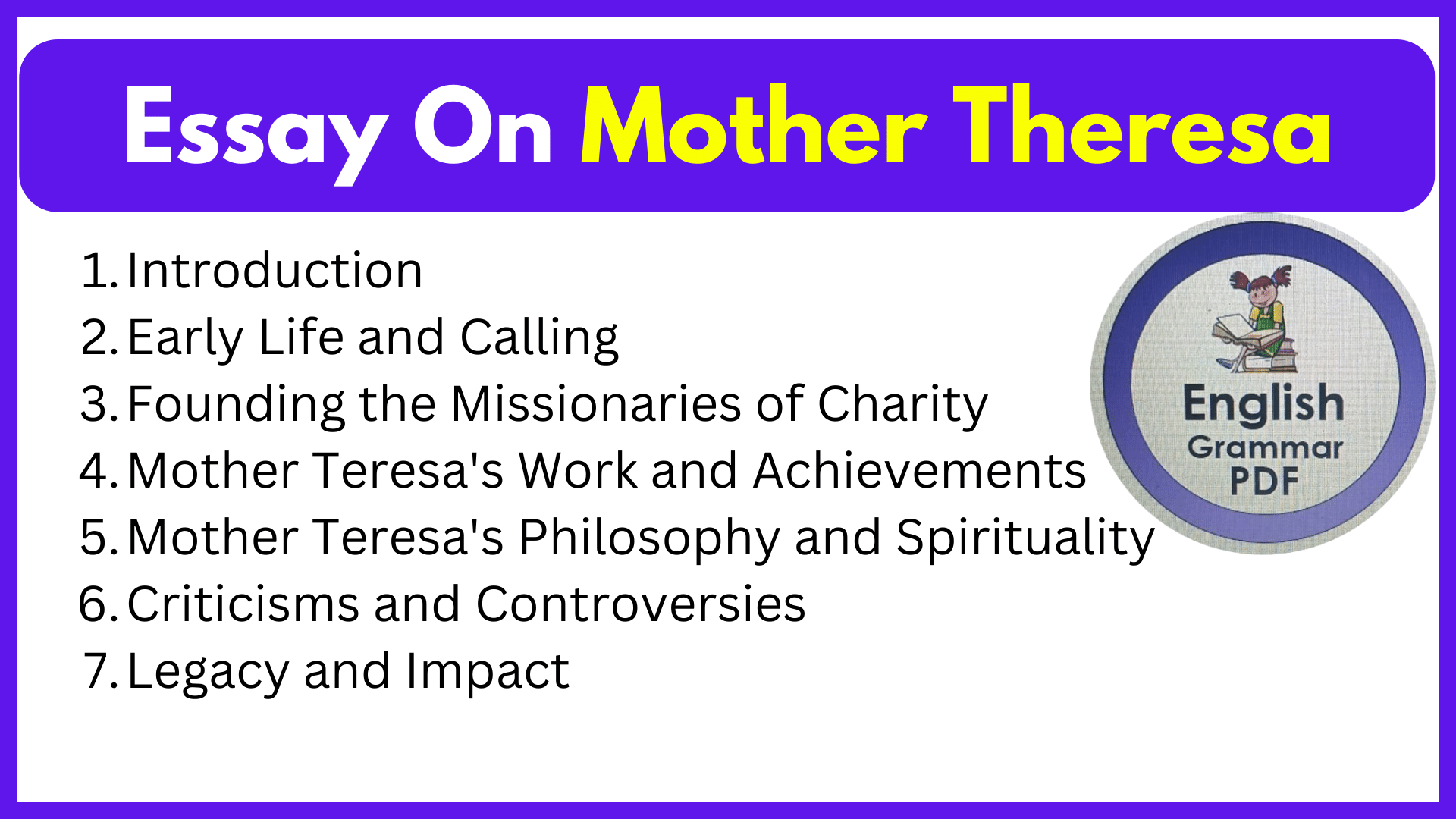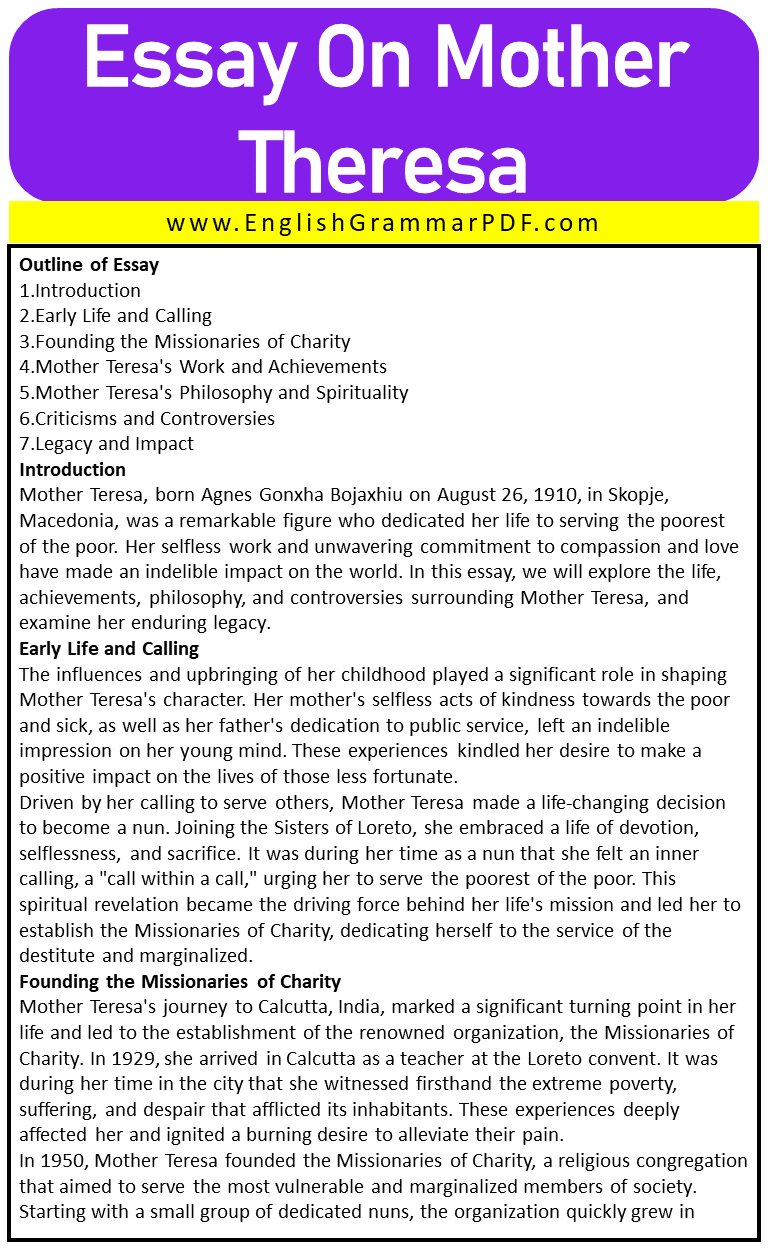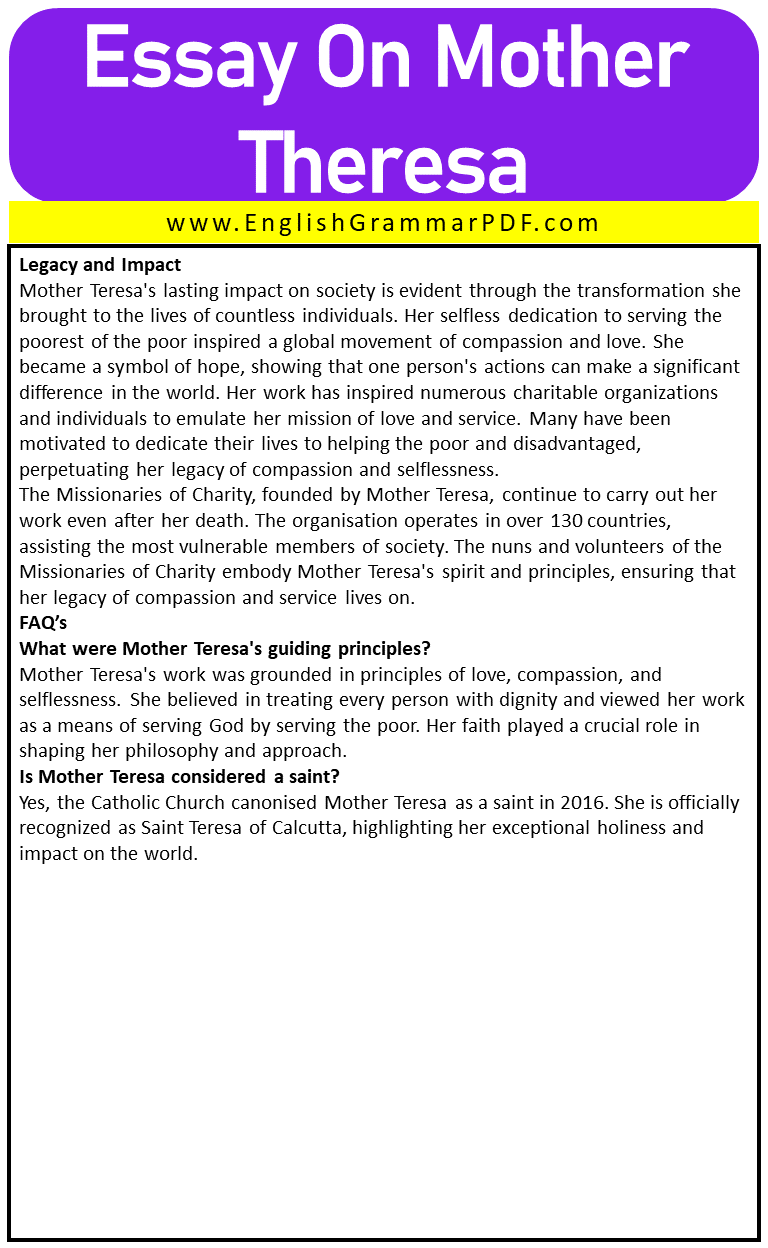Essay On Mother Theresa
Outline of Essay
- Introduction
- Early Life and Calling
- Founding the Missionaries of Charity
- Mother Teresa’s Work and Achievements
- Mother Teresa’s Philosophy and Spirituality
- Criticisms and Controversies
- Legacy and Impact
Introduction
Mother Teresa, born Agnes Gonxha Bojaxhiu on August 26, 1910, in Skopje, Macedonia, was a remarkable figure who dedicated her life to serving the poorest of the poor. Her selfless work and unwavering commitment to compassion and love have made an indelible impact on the world. In this essay, we will explore the life, achievements, philosophy, and controversies surrounding Mother Teresa, and examine her enduring legacy.
Early Life and Calling
The influences and upbringing of her childhood played a significant role in shaping Mother Teresa’s character. Her mother’s selfless acts of kindness towards the poor and sick, as well as her father’s dedication to public service, left an indelible impression on her young mind. These experiences kindled her desire to make a positive impact on the lives of those less fortunate.
Driven by her calling to serve others, Mother Teresa made a life-changing decision to become a nun. Joining the Sisters of Loreto, she embraced a life of devotion, selflessness, and sacrifice. It was during her time as a nun that she felt an inner calling, a “call within a call,” urging her to serve the poorest of the poor. This spiritual revelation became the driving force behind her life’s mission and led her to establish the Missionaries of Charity, dedicating herself to the service of the destitute and marginalized.
Founding the Missionaries of Charity
Mother Teresa’s journey to Calcutta, India, marked a significant turning point in her life and led to the establishment of the renowned organization, the Missionaries of Charity. In 1929, she arrived in Calcutta as a teacher at the Loreto convent. It was during her time in the city that she witnessed firsthand the extreme poverty, suffering, and despair that afflicted its inhabitants. These experiences deeply affected her and ignited a burning desire to alleviate their pain.
In 1950, Mother Teresa founded the Missionaries of Charity, a religious congregation that aimed to serve the most vulnerable and marginalized members of society. Starting with a small group of dedicated nuns, the organization quickly grew in size and influence, reaching far beyond the borders of Calcutta. The Missionaries of Charity embraced a set of clear goals and principles. Their primary objective was to provide love, care, and compassion to those in need, particularly the destitute, the sick, and the dying. They sought to offer a haven for the abandoned, the forgotten, and the outcasts, ensuring that no one would have to suffer alone.
The organization’s principles were rooted in the belief that every individual, regardless of their circumstances, possessed inherent dignity and worth. Mother Teresa and her nuns considered their work as an expression of their faith, viewing each person they encountered as a manifestation of Christ himself. Their service was guided by the principles of simplicity, humility, and selflessness, with a focus on embracing the poorest of the poor with open arms and providing them with the necessary support and care they desperately needed. Through the Missionaries of Charity, Mother Teresa aimed to create a world where love and compassion triumphed over poverty and suffering. The organization continues its vital work to this day, embodying the unwavering dedication and spirit of service that Mother Teresa envisioned when she founded it over seven decades ago.
Mother Teresa’s Work and Achievements
Mother Teresa’s work and achievements exemplify a lifetime dedicated to serving the poorest of the poor and uplifting the downtrodden. Her profound compassion and unwavering commitment to making a difference have left an indelible mark on the world. Mother Teresa’s foremost mission was to serve the most vulnerable members of society. She tirelessly worked in slums, leper colonies, and hospices, providing comfort and care to those abandoned by society. Her presence brought solace to the suffering and reminded them of their inherent dignity.
Throughout her life, Mother Teresa opened numerous charitable institutions around the world. These institutions, including homes for the dying, orphanages, schools, and clinics, became beacons of hope in communities plagued by poverty and despair. They offered a lifeline to countless individuals, providing them with not only essential services but also a sense of belonging and purpose. Mother Teresa’s tireless efforts and profound impact did not go unnoticed. She received numerous accolades and recognition for her humanitarian work, including the Nobel Peace Prize in 1979. These honours served as a testament to her selfless dedication and inspired others to follow in her footsteps.
Mother Teresa’s Philosophy and Spirituality
Mother Teresa’s philosophy and spirituality were deeply rooted in her unwavering faith and devotion. Her Catholic faith served as the bedrock of her life’s work and motivated her every action. Mother Teresa’s strong belief in God and the power of prayer sustained her during challenging times and provided her with the strength to persevere in her mission. She saw her work as a calling from God, viewing each act of service as an opportunity to serve Him by serving the poor and marginalized.
Compassion and love were the guiding principles that shaped Mother Teresa’s approach to her work. She believed that genuine compassion was not merely feeling pity or sympathy, but rather taking action to alleviate the suffering of others. She saw each person she encountered as a beloved child of God, deserving of love, respect, and dignity. Love, for Mother Teresa, was not limited to words or sentiment but manifested in selfless acts of service. She embraced a life of simplicity and selflessness, recognizing that true happiness came from giving rather than receiving.
Mother Teresa’s philosophy and spirituality continue to inspire people from all walks of life. Her unwavering faith, the influence of her Catholic beliefs, and her embodiment of compassion and love serve as a timeless reminder of the power of faith, kindness, and service to transform lives and make a positive impact on the world.
Criticisms and Controversies
Mother Teresa’s approach to charity and her work with the Missionaries of Charity were not without criticisms and controversies. While she was widely revered and celebrated for her humanitarian efforts, some raised concerns about her methods and the impact of her work. One of the main criticisms of Mother Teresa’s approach was that her focus on immediate relief and individual acts of charity neglected the underlying systemic issues that perpetuated poverty and suffering. Some argued that her emphasis on providing temporary comfort did not address the root causes of poverty and that more sustainable and systemic change was needed to alleviate the plight of the poor.
Mother Teresa and the Missionaries of Charity faced allegations of inadequate medical care in their facilities. Critics claimed that the level of medical treatment provided to the sick and dying was subpar and that proper medical protocols were not always followed. These allegations prompted investigations and scrutiny, and the organization responded by striving to improve its services while maintaining its focus on compassion and personal attention.
Critics argue that while charity is important in providing immediate relief, it does not address the structural issues that lead to poverty and inequality. They argue for a shift towards efforts that focus on systemic change, such as advocating for policy reforms, social justice, and addressing the root causes of poverty. Proponents of Mother Teresa’s approach contend that charity provides immediate aid and comfort to those in need and that it is possible to combine charity with efforts towards systemic change.
Legacy and Impact
Mother Teresa’s lasting impact on society is evident through the transformation she brought to the lives of countless individuals. Her selfless dedication to serving the poorest of the poor inspired a global movement of compassion and love. She became a symbol of hope, showing that one person’s actions can make a significant difference in the world. Her work has inspired numerous charitable organizations and individuals to emulate her mission of love and service. Many have been motivated to dedicate their lives to helping the poor and disadvantaged, perpetuating her legacy of compassion and selflessness.
The Missionaries of Charity, founded by Mother Teresa, continue to carry out her work even after her death. The organisation operates in over 130 countries, assisting the most vulnerable members of society. The nuns and volunteers of the Missionaries of Charity embody Mother Teresa’s spirit and principles, ensuring that her legacy of compassion and service lives on.
FAQ’s
What were Mother Teresa’s guiding principles?
Mother Teresa’s work was grounded in principles of love, compassion, and selflessness. She believed in treating every person with dignity and viewed her work as a means of serving God by serving the poor. Her faith played a crucial role in shaping her philosophy and approach.
Is Mother Teresa considered a saint?
Yes, the Catholic Church canonised Mother Teresa as a saint in 2016. She is officially recognized as Saint Teresa of Calcutta, highlighting her exceptional holiness and impact on the world.
Explore More Essays:
Download the PDF of the Essay:







